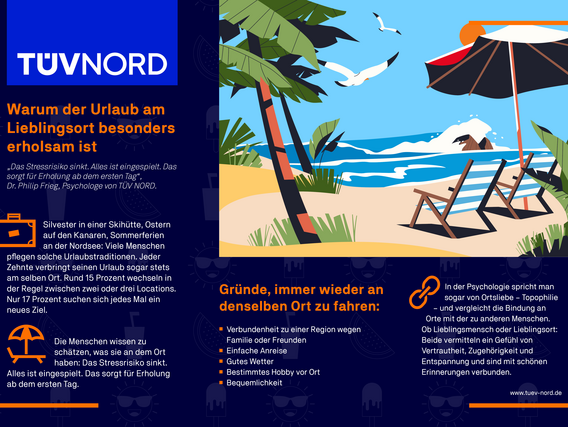Why a vacation at your favorite place is particularly relaxing
People & Empowerment: There are many good reasons to travel to the same place again and again on vacation, says psychologist Philip Frieg from TÜV NORD.

People & Empowerment: There are many good reasons to travel to the same place again and again on vacation, says psychologist Philip Frieg from TÜV NORD.

New Year's Eve in a ski lodge, Easter in the Canary Islands, summer holidays on the North Sea: many people cultivate such holiday traditions. One in ten people even spend their holidays in the same place every year, according to a survey commissioned by Airbnb in 2019. However, most people combine old and new: more than one in two respondents said that although they have a favourite place, they occasionally prefer a change. Around 15 per cent usually switch between two or three locations. Only 17 per cent look for a new destination every time.
‘There are many good reasons for travelling to the same place again and again,’ says Philip Frieg from the Medical-Psychological Institute of TÜV NORD in Dortmund. For example, some people feel connected to a region because they have family or acquaintances there. Or they return because the journey is easy, because the weather is always good there or because they can pursue a particular hobby. Some shy away from the risk of trying something new and always book the same hotel for the sake of convenience. And still others have simply found a place that they particularly like - perhaps because of the nature, the architecture, the culture or the local people.
‘The bond with your favourite place can be very strong,’ explains Frieg, who holds a doctorate in psychology. In psychology, we even speak of love of place - topophilia - and compare the bond to places with that to other people. Whether it's a favourite person or a favourite place, both convey a feeling of familiarity, belonging and relaxation and are associated with fond memories.
In tourism, this emotional bond is worth money. Because regular guests come back without having to be wooed, on the contrary: they provide new customers by leaving positive reviews online and raving about their holiday at home. How a guest becomes a regular guest is therefore an important question in tourism research.
The key findings are unsurprising: guests return when they are satisfied - or more precisely: when they feel comfortable, have recovered and have left with fond memories. If someone comes back a second time, the chances of further visits increase. Familiarity promotes well-being, as a study on the Fiji Islands has shown, for example. The regular guests also described feeling a sense of belonging there. This experienced connection between the place and one's own identity is the most important facet of emotional attachment to a place - and the key to loyal customers.
This is also how the British tourism researchers Jackie Clarke and David Bowen describe it following interviews with regular guests in Welsh holiday resorts. Their central motif was also a sense of belonging: ‘I belong here’ was a typical statement. Most of them had built up a deep bond, in some cases over decades. Some had discovered their favourite place themselves; others were connected to it for family reasons, and the place also fulfilled individual needs and desires such as enjoying nature or pursuing certain activities.
What regular visitors to Wales also appreciated was that they felt they already knew about the most beautiful places and hiking trails, about the people and local customs. They had developed habits that they found relaxing and that they could immediately cultivate again in a familiar place - without having to orientate themselves and settle in first.
‘The risk of stress decreases. Everything is well-rehearsed. This ensures relaxation from day one,’ says Philip Frieg from TÜV NORD. ‘You know where the view is the best and the food the tastiest - not to mention where to find a car park.’

There are many good reasons for travelling to the same place again and again, for example to pursue a particular hobby.
Founded over 150 years ago, we stand for security and trust worldwide. As a knowledge company, we have the digital future firmly in our sights. Whether engineers, IT security experts or specialists for the mobility of the future: in more than 100 countries, we ensure that our customers become even more successful in the networked world.